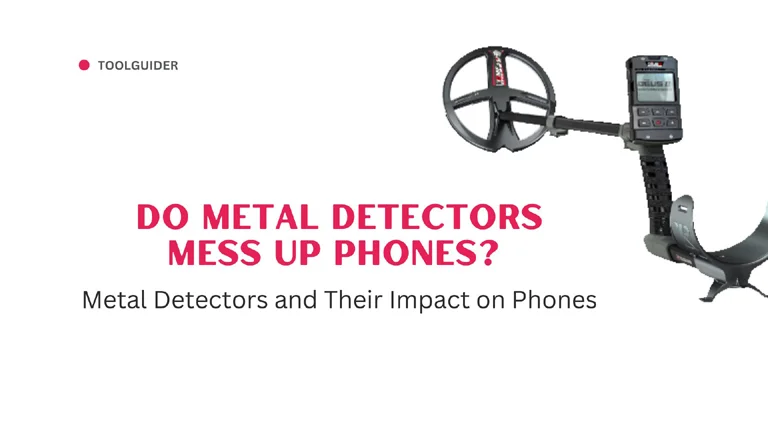Do metal detectors mess up phones? Metal detectors used in public places pose no significant threat to modern smartphones or electronic devices. They generate low-frequency electromagnetic fields that are substantially below permitted limits and are unlikely to cause long-term harm.
By understanding the science behind metal detectors and smartphone resilience, we can dispel any myths and confidently navigate security checkpoints with our electronic devices intact. These devices are designed to meet strict safety standards, ensuring they do not generate strong enough fields to cause damage to smartphones or other consumer electronics.
Understanding Metal Detectors and Their Purpose
Metal detectors work based on the principle of electromagnetic induction and are widely used in various applications, primarily for security and detection purposes.
Function
The metal detector’s receiver coil, located adjacent to the transmitter coil, detects these disturbances. The receiver coil acts as a sensor, and the resulting changes in the electromagnetic field are translated into an audible or visual signal, alerting the operator to the presence of metal.
Purpose
- They detect potentially dangerous metallic items such as weapons, knives, or other prohibited objects.
- Metal detectors aid in archaeological excavations and treasure hunting.
- In industrial settings, metal detectors are used to inspect raw materials, products on conveyor belts, and machinery for metal contaminants.
- In the mining and exploration industries, metal detectors are used to locate valuable mineral deposits containing metallic ores.
Electromagnetic Fields: Do metal detectors mess up phones?
A metal detector will not harm your phone. Metal detectors do not utilize magnetic fields to detect metal, contrary to popular belief. They detect metal using electrical conductivity rather than magnetism.
Even if they did involve magnets, solid-state storage in smartphones and other gadgets is unaffected by magnetic fields. Many phones now charge their batteries via magnets. A metal detector will not alter the information on your phone, nor will it harm the battery or screen.
They are capable of detecting smaller and deeper things and this renders them more susceptible to interference. Since detectors harness electromagnetic fields to identify buried metal, they are naturally prone to interference. Cell phones, like any other electrical device, produce electromagnetic fields. So, you might receive misleading indications.
Best Practices for Navigating Metal Detectors with Phones
While metal detectors play an important role in ensuring safety by detecting concealed metal objects, there have been concerns about the potential impact on electronic devices, particularly smartphones.
- If instructed, remove your smartphone from your pocket and place it in a tray provided for screening before passing through the metal detector.
- Avoid placing your smartphone directly on the metal detector’s surface or in a container with metallic objects, as this might increase the likelihood of temporary interference.
- There is interference between mobile phones and metal detectors. Just switch it off, activate airplane mode, or place it in your pocket.
- If you are carrying multiple electronic devices, consider organizing them in an accessible manner to facilitate the screening process.
Temporary Interference: Do metal detectors mess up phones?
One of the primary concerns regarding metal detectors and smartphones is the potential for electromagnetic interference. When a smartphone comes into proximity to a metal detector’s electromagnetic field, temporary interference might occur. This interference is usually minimal and causes no lasting damage.
You may notice a temporary loss of signal, distorted audio, or a slight disruption in the display. However, once the smartphone moves away from the metal detector, it should quickly return to normal functioning.
They are capable of detecting smaller and deeper things and this renders them more susceptible to interference. Since detectors harness electromagnetic fields to identify buried metal, they are naturally prone to interference. Cell phones, like any other electrical device, produce electromagnetic fields. So, you might see slightly misleading notifications.
Safety Measures to Protect Your Smartphone
- A sturdy case can shield your phone from accidental drops, bumps, and scratches.
- Tempered glass protectors offer an extra layer of protection against impact.
- Keep your smartphone away from liquids such as water, rain, or spilled drinks to avoid water damage.
- If your phone is not water-resistant, consider using a waterproof pouch or case when near water.
- Only download apps from official app stores (like the Apple App Store or Google Play Store) to reduce the risk of installing malicious software.
- Use original or certified charging accessories and avoid charging your phone with cheap or counterfeit cables that may damage the battery.
- Be cautious when clicking on links in messages or emails, especially from unknown sources.
Wrap up
Do metal detectors mess up phones? X-ray machines release electromagnetic energy that is not magnetic and does not damage or destroy electrical equipment or magnetic-sensitive data.
By following these best practices, you can confidently pass through metal detectors with your phone without encountering any issues or disruptions. Remember that metal detectors are designed to prioritize security and safety, and cooperation with security personnel ensures a seamless and hassle-free experience.
FAQ
Ans: Metal detectors contain extremely powerful magnetic fields that can potentially harm unsafe electronics. Some devices can be harmed by a metal detector. While the severity varies, you should always be cautious and keep your electronics away from powerful magnetic fields.
Ans: Your iPhone should not set off a metal detector. Standard metal detectors, such as those used at airports, museums, and event sites; do not often detect modern cellphones, including iPhones. Aluminum and other lightweight alloys used in cell phones are not strong or dense enough to set off metal detector alerts.
Ans: If the phone charger is built of metal, a metal detector can detect it. Because mobile phones and their chargers include ferrous metal components, this form of contraband may also be detected utilizing metal detection and ferromagnetic detection (FMD) devices.
Ans: You can adapt your Android phone into a metal detector using the Metal Detector app (by Smart Tools). Using the app can benefit you in locating little metal items before you trip on them or get them sucked up by your vacuum cleaner.
Ans: While an airport security X-ray scanner is “safe,” if you take your laptop through a metal detector or are checked with a metal wand, you may lose the hard drive. These detectors emit a powerful magnetic pulse capable of erasing hard drives.

I love all things tech, and I wear many hats – tech lover, business starter, digital marketer, and blogger. I know the ins and outs of Digital Marketing, SEO, SEM, SMM, and how to generate leads. My goal? Making things simple for you with clear guides and reviews. I stumbled upon WordPress while creating my first business site, and I fell in love with it right away. When I’m not building websites, creating content, or boosting clients’ online efforts, I’m focused on staying healthy, hanging out with family, and exploring the world. Connect with me on Facebook, Twitter, Linkedin, or read my complete biography.

